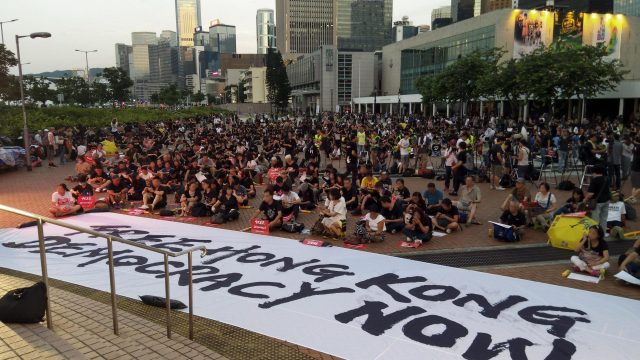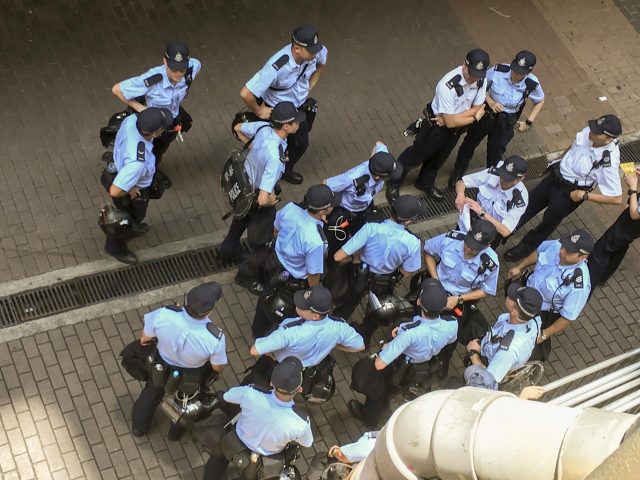
China unveiled the details Saturday of a planned national security law for Hong Kong that will allow the Communist Party to markedly expand its power in and tighten its control of the Asian financial hub.
China’s top lawmaking body, the National People’s Congress Standing Committee, wound up its meeting Saturday without the legislation being formally approved, though the details released by China’s official Xinhua News Agency prompted widespread unease among legal experts and analysts.
China repeatedly has prompted Hong Kong leaders to enact legislation to plug the “loophole” of national security in the wake of the yearlong protests in Hong Kong sparked by a controversial extradition bill that could see individuals sent to China for trials.
According to an explanation of the law released by Xinhua, a new national security commission headed by its Beijing-appointed top leader — but supervised by the Chinese government — will be established in Hong Kong. Chinese security agents, which it says are required to follow Hong Kong laws, also will be stationed in the city to deal directly with some cases there.
The release said an agency would be established to analyze the national security situation in Hong Kong and “monitor, supervise, coordinate and support” the local government’s efforts, collect intelligence and handle relevant cases.
The release said the new legislation would grant power to Hong Kong’s top leader to choose judges to handle national security cases in the city — a move sharply criticized by legal experts as undermining the principle of the rule of law and the separation of powers.
Basic Law
Although Hong Kong reverted from British to Chinese rule in 1997, its post-handover mini-constitution, the Basic Law, safeguards the city’s basic freedoms and civil liberties, as well as the rule of law according to the common law tradition.
Experts say the national security law, which the state media release says “will supersede local legislation should conflicts arise,” will effectively sabotage the rule of law. The statement added that the power of interpreting the new law is vested in the Chinese legislature’s top committee, the National People’s Congress Standing Committee.
Echoing a senior Chinese official’s rhetoric from Monday, the statement says the enforcement of the national security law will be mainly carried out by Hong Kong authorities, except in “‘very few cases” where Beijing’s national security commissioner based in Hong Kong will retain jurisdiction.
“[This will] manifest the central government’s comprehensive jurisdiction over Hong Kong, which will be beneficial for strengthening national security and avoiding emergency situations,” it reads.
Tam Yiu Chung, Hong Kong’s sole member of the National People’s Congress Standing Committee, told reporters the Chinese authorities would directly intervene only in “exceptional” circumstances, such as if unrest turned into war or the local government “became out of control.”
The Xinhua statement says the draft also contains penalties for offenses relating to separatism, subversion, terrorism and collusion with foreign forces, but it did not give details.
Tam said the jail sentences were likely to range from three years for minor cases to five to 10 years for more serious cases. He also said it was likely the law would not be retroactive.
Additionally, the statement also said while Hong Kong’s police are to set up a special unit to enforce the national security law, the city’s department of justice will create a special prosecution unit for national security crimes.
The law also will require the Hong Kong government to strengthen supervision and management of schools and other organizations on matters relating to national security.
‘Stabbing … like a sword’
Civic Party leader Alvin Yeung, a barrister, said the details of the legislation show “Beijing’s power is stabbing right into Hong Kong’s judicial and administrative organs like a sword.”
“Hong Kong’s worst nightmare has been mapped out,” he said, adding that the lack of details on specific criminal actions was “extremely worrying.”
Kenneth Chan, a political science professor at Hong Kong Baptist University, said Hong Kong’s top leader being empowered to choose judges to hear national security cases undermines the rule of law and violates the principle of independent judiciary.
Jerome Cohen, a New York University law professor and Council on Foreign Relations senior fellow, said the Xinhua statement left many questions unanswered.
“How are the national security crimes being defined? By what criteria will the [top leader] select judges, and why is this special system necessary?” he said.
Although the Xinhua statement mentions that when enacting the law, Hong Kong authorities shall also “respect and protect human rights” and safeguard citizens’ rights and freedoms in accordance with the Basic Law and the International Covenant on Civil and Political Rights, Cohen called these “eye candies.” He pointed out “the very provisions in the national security law violate those protections.”
“The handover has clearly become the takeover,” he said, referring to the Hong Kong’s 1997 handover of sovereignty.

No ability to challenge law
Michael Davis, a Global Fellow at the Woodrow Wilson International Center and former law professor at the University of Hong Kong, said it appeared that Hong Kong’s courts would not be able to contest the new legislation for possibilities of being unconstitutional.
He also was worried about the fact that the law allows the Chinese government to select cases over which it will claim jurisdiction. “Whether this is a ‘rare case’ or not, it opens the door to the very sort of criminal justice people feared in opposing the extradition law,” he said.
Political science expert Chan said, “We now see that the Basic Law and the institutional guarantees that are supposed to buttress the ‘one country, two systems’ policy is being dismantled by Beijing.”
“The mainland Chinese practice of law and politics, which are not supposed to have any place in the city, now takes precedence in the name of national security, patriotism and sovereignty,” he said.
Beijing reportedly wants to bring the law into force quickly, before the September election of the legislature, which currently is dominated by pro-Beijing lawmakers. Analysts have said the authorities were wary that pro-democracy politicians could repeat the success they experienced in the district council election last November and garner more seats in the legislature in the wake of the anti-government movement.
Chan said candidates who have opposed the national security law probably will be disqualified, as pro-Beijing politicians repeatedly have warned.
“The world should care about [this development] because it means Hong Kong is being taken over by the communist system and fast becoming just another coastal city of China,” he said.
Source: VOA












